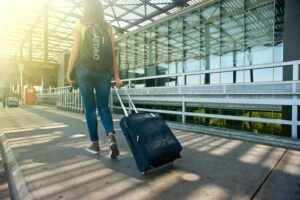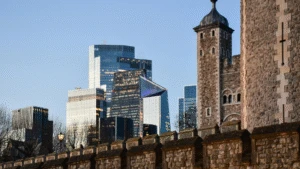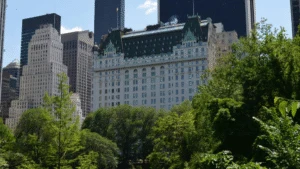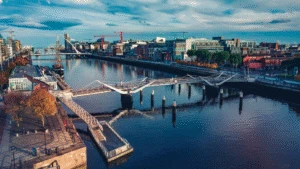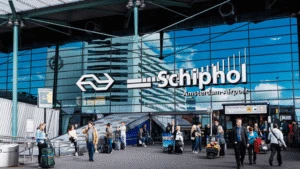London Fashion Week now operates under mandatory sustainability requirements that fundamentally change how the event functions. Business travelers and eco-conscious visitors attend an industry gathering where environmental responsibility has shifted from optional to required. In 2025, the British Fashion Council adopted Copenhagen Fashion Week’s strict sustainability guidelines, making London the first of the major fashion weeks to enforce such standards.
This shift creates opportunities for professionals seeking meaningful connections while maintaining their environmental values. Whether you’re networking, scouting partnerships, or researching emerging designers, your Fashion Week experience can align with the industry’s new environmental standards. These strategies help business travelers reduce their environmental impact while fully engaging with London’s fashion community.
From low-carbon transport and responsible dining to choosing certified hotels and supporting transparent designers, you’ll find practical strategies to align your Fashion Week experience with greener values.
Can Your Fashion Week Participation Actually Drive Industry Change?
The British Fashion Council now requires designers to source at least 60% of their collections from certified, preferred, or deadstock materials like GOTS-certified cotton, FSC viscose, or upcycled fabrics. Exotic animal skins, virgin fur, and wild bird feathers are banned from runways, and brands must disclose their material origins and waste management policies.
These requirements extend beyond major labels to the entire London fashion community. Attendees can amplify this progress by actively supporting brands with transparent sustainability credentials. The BFC’s NewGen talent incubator showcases emerging designers who prioritize responsible sourcing over fast fashion practices.
When networking at shows and showrooms, ask specific questions about material sourcing and production processes. Choose brands that invest in circular design principles—repairability, recyclability, and reusability. Support local businesses and emerging designers who demonstrate genuine commitment to environmental responsibility rather than those practicing greenwashing.
What Are the Best Low-Carbon Ways to Navigate London During Fashion Week?
London’s compact geography and extensive public transport network make sustainable travel between venues straightforward. Major show locations like the BFC Show Space, International Fashion Showcase, and satellite events across Soho, Shoreditch, and Covent Garden connect easily via Tube, Elizabeth Line, and buses. Oyster cards and contactless payments streamline daily commutes.
Many Fashion Week hotspots sit within walking distance of each other, making pedestrian routes both practical and energizing. Santander Cycles and e-scooters offer quick connections for back-to-back meetings. When you need a vehicle for equipment or samples, Zipcar provides electric cars and ultra-low emission vans specifically for fashion professionals during Fashion Week.
For European arrivals, Eurostar and rail connections significantly reduce emissions compared to short-haul flights. London’s major train stations connect directly to show venues, making it easy for attendees to reach multiple events without relying on cars.

How Do You Address Emissions from Fashion Week Travel?
Even environmentally conscious itineraries generate carbon emissions from flights, accommodation, and event attendance. While traditional offsetting programs have limitations—they often delay action rather than prevent emissions—there are more direct approaches to addressing your travel impact.
Calculate your footprint using online tools that account for flights, hotel stays, and local transport. Include indirect emissions from event production if you’re hosting presentations or exhibitions. Focus first on reducing emissions through transport choices, accommodation selection, and consumption habits. Exploring Dyme’s insights on what is renewable energy can provide context for these choices.
Dyme takes a different approach by funding renewable energy projects with each booking rather than traditional carbon offsetting. This investment directly supports clean energy infrastructure that reduces future emissions rather than attempting to neutralize past ones. When booking through Dyme, your stay automatically contributes to renewable energy development projects that create lasting environmental benefits.
London hotels are increasingly adopting renewable energy partnerships. Maybourne’s luxury properties including Claridge’s, The Connaught, The Berkeley, and The Emory now run on 100% renewable energy through a 15-year solar power agreement. The Hari London switched to 100% renewable electricity in 2024, while Red Carnation Hotels operates all UK properties on renewable energy.
Where Can You Find the Most Sustainable Dining Options During Fashion Week?
London’s restaurant scene increasingly caters to sustainability-minded diners with plant-based, locally sourced, and zero-waste options that keep fashion professionals energized throughout intensive schedules.
Farmacy in Notting Hill serves entirely plant-based, seasonal dishes designed for sustained energy during long Fashion Week days. Ottolenghi Spitalfields offers vegetable-forward Middle Eastern cuisine with locations convenient to East London venues. Redemption Bar operates multiple central locations serving alcohol-free, plant-based meals perfect for clear-headed business meetings.
The Gate provides refined vegetarian dining in Marylebone and St. John’s Wood—ideal for networking dinners with elevated meat-free menus. Holy Carrot in Notting Hill specializes in visually appealing vegetarian small plates, while Jikoni in Marylebone operates as London’s first carbon-neutral independent restaurant, serving globally inspired dishes with minimal environmental impact.
These establishments connect diners with London’s community of chefs and restaurateurs leading the city’s sustainable food movement. They demonstrate how conscious dining choices can support local innovation while maintaining the social aspects essential to Fashion Week networking.
Which Sustainable Side Events Deserve Your Attention?
Fashion Week’s official programming represents just one layer of London’s sustainable fashion ecosystem. Alternative events often deliver deeper insights into industry transformation and future opportunities.
The Institute for Positive Fashion, organized by the British Fashion Council, hosts sessions focused on circularity, innovation, and responsible business practices—essential for professionals seeking to future-proof their operations. Sustainable Fashion Week London runs citywide programming that showcases designers, makers, and activists redefining fashion’s relationship with environmental stewardship.
Material Futures exhibitions highlight next-generation innovations like mushroom leather and recycled polymers that are reshaping responsible design. Local maker markets in Camden, Spitalfields, and Portobello Road feature independent designers and artisans committed to ethical production methods.
These events provide networking opportunities with industry leaders driving genuine change rather than superficial sustainability marketing. They offer practical insights into implementing responsible practices across different business scales and market segments.
How Can You Choose London Hotels That Actually Walk the Sustainability Walk?
Accommodation choices significantly impact your Fashion Week environmental footprint. London offers numerous hotels with verified environmental credentials rather than vague green claims. Properties with Green Key, Green Tourism, or BREEAM certifications demonstrate measurable commitments to energy efficiency, waste reduction, and community engagement.
Look for hotels featuring energy-efficient systems like LED lighting and smart thermostats, comprehensive recycling programs, and locally sourced breakfast offerings. Many properties now partner with ethical suppliers and operate renewable energy systems.
Dyme’s curated selection includes London hotels in key districts like Mayfair, Soho, Shoreditch, and Kensington that have earned environmental certifications through independent auditing. These properties support broader sustainability initiatives while providing the comfort and convenience business travelers require during intensive Fashion Week schedules.
Choosing verified sustainable accommodation supports businesses implementing genuine environmental improvements rather than those engaging in greenwashing tactics.
Sustainable Transport Options for Navigating London Fashion Week
Hotel choice is just the beginning. London offers many ways for eco-conscious business travelers to stay productive and reduce their footprint during Fashion Week.
Public Transport Excellence
London’s tube is among the world’s most comprehensive networks, connecting nearly every Fashion Week venue. The Central, Northern, and District lines reach key areas like Covent Garden, King’s Cross, and Westminster. Fares start at £2.80 with contactless payment, and a daily cap keeps costs manageable.
Buses provide another low-impact option. The red double-deckers run frequently and cost £1.75 per ride. Night buses cover the city after the tube closes, ideal for late events and after-parties.
Walking and Cycling
Central London’s compact geography makes walking between venues practical—often faster than the tube at rush hour. The walk from Covent Garden to Somerset House is under 10 minutes, while Oxford Street to Regent Street takes only 5–7 minutes.
Santander Cycles (Boris Bikes) add another option. Docking stations are close to most venues, and the first 30 minutes cost £2. Hotels like 1 Hotel Mayfair sit near cycle hire stations, making short rides convenient and eco-friendly.
Electric and Hybrid Options
For longer trips or when carrying samples, electric black cabs offer a lower-impact alternative to traditional taxis. Uber Green also provides hybrid and electric rides, though availability can vary.
Some hotels integrate transport into their services. 1 Hotel Mayfair, for example, offers electric house cars and on-site charging for guests using EV rentals.
Regional Connections
Events outside central London, such as those in East London or Canary Wharf, are well served by the Elizabeth line. This modern, electric-powered service runs every 5 minutes during peak hours and cuts travel time compared to older lines.
For trips beyond London, National Rail’s electric and hybrid trains connect fashion hubs like Birmingham and Manchester. Rail produces far fewer emissions than flying or driving, making it the sustainable choice for extended business travel.
Fashion Week as a Model for Responsible Business Travel
London Fashion Week 2025 demonstrates how major industries can integrate mandatory sustainability requirements without sacrificing creativity or commercial success. The event now operates under strict environmental guidelines while maintaining its position as a global fashion capital.
Business travelers can learn from this approach by prioritizing verified sustainable practices over superficial green marketing. Choose transportation options that minimize emissions, support restaurants and hotels with transparent environmental policies, and engage with events that showcase genuine innovation rather than sustainability theater. This aligns with a broader sustainable business travel strategy.
The fashion industry’s adoption of mandatory environmental standards signals broader changes across business travel. Companies increasingly expect their representatives to demonstrate environmental responsibility while maintaining professional effectiveness. Fashion Week provides a practical example for achieving both objectives simultaneously.
Your participation in sustainable Fashion Week practices connects you with industry leaders shaping the future of responsible business operations. This approach builds valuable professional networks while supporting the environmental initiatives that will define business success in coming years.For more ideas, Dyme offers several sustainable business travel tips for eco-conscious professionals. Travelers can also find sustainable stays in London during Fashion Week, which combine convenience with genuine environmental practices.

